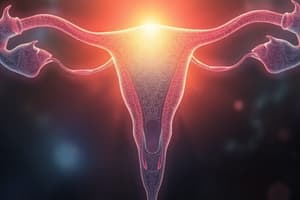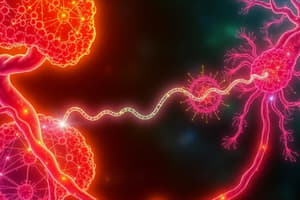Podcast
Questions and Answers
What are negative core beliefs?
What are negative core beliefs?
What impact can negative core beliefs have on our lives?
What impact can negative core beliefs have on our lives?
What is healthy shame?
What is healthy shame?
What is toxic shame?
What is toxic shame?
Signup and view all the answers
What is an example of negative core beliefs impacting our lives?
What is an example of negative core beliefs impacting our lives?
Signup and view all the answers
What can negative core beliefs be imprinted by?
What can negative core beliefs be imprinted by?
Signup and view all the answers
What is the impact of negative core beliefs on decision-making?
What is the impact of negative core beliefs on decision-making?
Signup and view all the answers
What is the difference between healthy and toxic shame?
What is the difference between healthy and toxic shame?
Signup and view all the answers
What are negative core beliefs usually like?
What are negative core beliefs usually like?
Signup and view all the answers
What can negative core beliefs create in our lives?
What can negative core beliefs create in our lives?
Signup and view all the answers
What is shame?
What is shame?
Signup and view all the answers
What can cause negative core beliefs to form in us?
What can cause negative core beliefs to form in us?
Signup and view all the answers
What are negative core belief schemas?
What are negative core belief schemas?
Signup and view all the answers
What are some coping strategies learned from family of origin?
What are some coping strategies learned from family of origin?
Signup and view all the answers
What can poor boundary systems lead to?
What can poor boundary systems lead to?
Signup and view all the answers
What can coping mechanisms and strategies intensify as stress increases?
What can coping mechanisms and strategies intensify as stress increases?
Signup and view all the answers
What is the first problem that can lead to additional problems?
What is the first problem that can lead to additional problems?
Signup and view all the answers
What should treatment for negative core beliefs and coping strategies focus on?
What should treatment for negative core beliefs and coping strategies focus on?
Signup and view all the answers
What can avoidance, anger and rage, and overshopping coping strategies do?
What can avoidance, anger and rage, and overshopping coping strategies do?
Signup and view all the answers
What can intensity cycles involve?
What can intensity cycles involve?
Signup and view all the answers
What can poor boundary systems lead to when receiving constructive feedback?
What can poor boundary systems lead to when receiving constructive feedback?
Signup and view all the answers
What is the role of parents in passing down coping strategies?
What is the role of parents in passing down coping strategies?
Signup and view all the answers
What are coping strategies that can lead to more severe problems?
What are coping strategies that can lead to more severe problems?
Signup and view all the answers
What is the impact of negative core belief schemas on adult behaviors and coping strategies?
What is the impact of negative core belief schemas on adult behaviors and coping strategies?
Signup and view all the answers
Study Notes
Negative Core Beliefs and Schemas: How They Form and Impact Our Lives
- Negative core beliefs are beliefs about ourselves, others, and the world that become embedded in us, usually when we're young.
- Our brains form around our environment, and we learn how to survive and stay safe, even if it means not setting us up for the most healthy, balanced adult we could be.
- Shame is an extreme example of negative core beliefs, and it can be healthy or toxic.
- When we are being abused or threatened by the person in our life that's supposed to protect us, shame is the only emotion that's powerful enough to disrupt proximity seeking.
- Healthy shame is feeling bad about something we did wrong, while toxic shame is feeling that we are bad and wrong as a person.
- Negative core beliefs can be damaging because we internalize ideas that we are bad, wrong, and don't deserve help.
- Core beliefs can impact every decision we make, and they can look like "I can't succeed in anything" or "I am not worth it."
- Negative core beliefs can be imprinted by constantly being ridiculed, not given support, undiagnosed disabilities, or families that are committed to excellence.
- Negative core beliefs are usually very simple, such as "I'm not good enough" or "I will fail."
- The schema that negative core beliefs create can manifest in complicated ways that have tentacles that travel far into our adult lives.
- We can be wounded in childhood by things that society and many people would think are beneficial or esteeming.
- Negative core beliefs can create inherent vulnerability, which we have to deal with later on in life.
The Impact of Negative Core Beliefs on Adult Behaviors and Coping Strategies
- Negative core belief schemas are often embedded in us in early life and influence our decisions and behaviors as adults.
- These beliefs are usually unconscious and can lead to stress when life doesn't work out as we want it to.
- Coping strategies learned from family of origin can include avoidance, anger and rage, alcohol and drug use, intensity cycles, and overshopping.
- Poor boundary systems can reinforce negative core beliefs and lead to self-esteem failure when receiving constructive feedback.
- Coping mechanisms and strategies intensify as stress increases, leading to more severe problems like substance use disorders, gambling issues, affairs, and family problems.
- The first problem (negative core beliefs) started out as a solution to managing pain, but the coping strategies used to manage it can lead to additional problems.
- Good treatment for these issues involves addressing both the negative core beliefs and coping strategies.
- Treatment should focus on making significant shifts and improvements rather than just managing the issues.
- Parents often pass down coping strategies and may not have the tools or coping skills to teach their children.
- Avoidance, anger and rage, and overshopping are coping strategies that take us away from what's dysfunctional rather than dealing with it.
- Intensity cycles can involve addiction to work, relationships outside of marriage or family, or overshopping.
- Poor boundary systems can lead to feeling offended, violated, or like things aren't fair, which reinforces negative core beliefs.
Studying That Suits You
Use AI to generate personalized quizzes and flashcards to suit your learning preferences.





